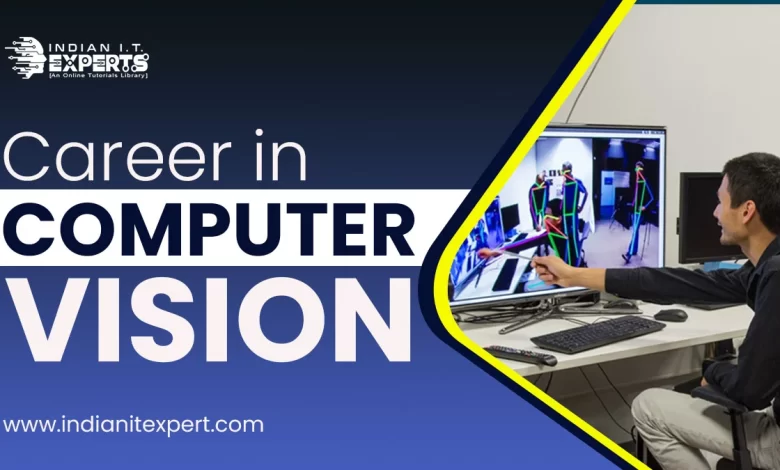Career in Computer Vision | Computer Vision Engineer

Computer vision bridges the gap between artificial intelligence and image processing, creating systems that can interpret and understand the visual world around us. This technology is crucial for real-world applications, from self-driving cars to advanced robotics. Startups and software companies are actively seeking these specialists to drive innovation in healthcare, entertainment, security, and beyond. This article will delve into the details of a career in computer vision, explore the path to becoming one, and answer frequently asked questions about this exciting field.
Table of Contents
What is computer vision?

Computer vision is a field of artificial intelligence (AI) that deals with training computers to see and interpret the world around them in a similar way that humans do. It involves using cameras and digital images to extract information from the visual world, like objects, people, and their movements.
Also read: 10 ऐसी jobs future के लिए जिसका AI कुछ नही बिगाड़ सकती
Responsibilities of Computer Vision Engineer

Computer vision engineers are the detectives of the digital world, using data to train computers to see. They gather massive amounts of images and videos to https://www.sushimasava.com/ teach machines how to identify objects and people, and even understand entire scenes. Their job involves several key tasks:
- Data Acquisition and Prep: They act as data wranglers, collecting and cleaning vast datasets to ensure the information fed to the machines is accurate.
- Algorithm Architects: They design and build special programs, like object detection or facial recognition that allow computers to “see” and interpret visual data.
- Machine Learning Masters: They train powerful neural networks using the data, fine-tuning them to perform specific vision tasks.
- Real-Time Results: They create pipelines to process images and videos in real-time, enabling applications like self-driving cars and augmented reality.
- Testing and Troubleshooting: They meticulously test and debug their creations to guarantee reliable computer vision systems.
- Teamwork Makes the Dream Work: Collaboration is key. They work alongside software developers, data scientists, and other experts to bring their projects to life.
What is the salary prospect for a career in Computer Vision?
Computer vision engineers are a specialized type of computer and information research scientist. While the average research scientist earns around $136k annually, computer vision engineers often command higher salaries due to their expertise in image processing and analysis. It’s important to note that computer vision engineer salaries can vary considerably. Several factors influence their pay, including experience level, educational background, and the specific industry they work in.
How to start your career in computer Vision?
These are 8 steps you should take to start your career in computer vision:
1. Get right education

Launching a successful career in computer vision engineering requires a solid educational foundation that bridges the gap between software and hardware. While computer science equips you with the software development skills needed to build applications like facial recognition, electrical engineering provides the understanding to design the cameras and sensors that capture the visual data in the first place. A bachelor’s degree in computer science, electrical engineering, or a related field like data science is a typical starting point. These programs equip you with the problem-solving abilities and fundamental knowledge required for the role.
2. Gain core knowledge and skills

Launching into the world of computer vision requires a strong foundation in programming. Python, with its beginner-friendly nature and extensive libraries, is perfect for quickly building and testing your ideas. Java, on the other hand, shines in high-performance applications, ensuring your computer vision models run smoothly and reliably.
Beyond programming, mastering algorithms is essential for optimizing how you process images and extract key features. Additionally, a solid understanding of linear algebra empowers you to tackle tasks like calibration, a frequent requirement in computer vision. Data science fundamentals are also a must-have, as they equip you to effectively prepare and interpret the data you’ll be working with.
3. Gain experience

Gaining hands-on experience through projects, internships, or collaborations allows you to tackle real-world problems. Consider projects in computer vision engineering, like building an autonomous security system that identifies intruders through image segmentation and face recognition. You can also delve into visual data analysis by creating a tool that automatically categorizes photos based on content. Furthermore, staying current with research keeps your problem-solving skills sharp and your expertise relevant by incorporating the latest advancements in computer vision.
4. Develop skills

Effective communication is the bedrock of successful collaboration in any field, including computer vision. Strong soft skills like active listening, empathy, and clear explanation allow team members to share knowledge, understand diverse viewpoints, and build a positive working environment. This collaborative spirit, fostered by effective communication, is essential for computer vision projects. When software developers, data scientists, and other experts can freely exchange ideas and updates, it fuels project progress, facilitates model improvements, and ultimately advances the entire field.
Also read: The Impact of Artificial Intelligence (AI) on the future work
5. Learn how to use frameworks

Machine learning frameworks act as engineer toolkits, offering pre-built components and libraries to create models without starting from scratch. TensorFlow, an open-source library with pre-trained models, integrates with Keras for deep learning building blocks. PyTorch’s dynamic graphs are ideal for complex vision tasks, while OpenCV simplifies image and video processing. Mastering these frameworks empowers engineers to develop efficient solutions for complex tasks, significantly accelerating the software development process.
6. Get certifications

Earning certifications in computer vision, like the IABAC Certified Computer Vision Expert (CCVE), demonstrates your knowledge and commitment to the field. These credentials can also specialize you in areas like machine learning or autonomous navigation. Beyond improving your job prospects, certifications connect you with industry professionals and showcase your dedication to continuous learning, making you adaptable to the evolving field of computer vision.
7. Create a strong portfolio

By showcasing your computer vision projects through a well-documented report or webpage detailing the project’s goals, approach, and accomplishments, you can effectively demonstrate your skills and expertise in computer vision engineering to potential employers. Sharing your code on platforms like GitHub allows for transparency and facilitates review and replication of your work by others. Additionally, including visual outputs like images or videos brings your computer vision model’s capabilities to life.
8. Consider different career paths

The job market for computer vision engineers is booming, with the field of computer and information research science expected to grow by 23% by 2032. This opens doors to diverse career paths like machine learning engineer, data scientist, and research scientist, across industries like healthcare, automotive, and entertainment. With automation and machine vision emerging as strong areas, specializing in a specific computer vision field can further elevate your skills and make you highly sought-after in this dynamic and growing industry.
Conclusion
The field of computer vision is rapidly evolving and offers a chance to be at the forefront of technological innovation. If you’re passionate about combining computer science with real-world problem-solving, then a career in computer vision could be the perfect fit. With its growing demand and vast applications, this field promises a stimulating and rewarding journey.
Also, check:
FAQs
1. What kind of jobs are available in computer vision?
Computer vision specialists can find careers as computer vision engineers, machine learning engineers, research scientists, and more, working in various industries.
2. What skills are needed for a computer vision career?
Strong programming skills, knowledge of machine learning and deep learning, and familiarity with computer vision algorithms are essential.
3. What is the educational background for a computer vision career?
A bachelor’s degree in computer science, electrical engineering, or a similar field is preferred, with a master’s degree offering an edge.
4. Is computer vision a good career choice?
Computer vision is a rapidly growing field with high demand and promising job opportunities.
5. Where can I learn more about computer vision?
Numerous online resources, courses, and degree programs in computer science or related fields offer in-depth information on computer vision.




